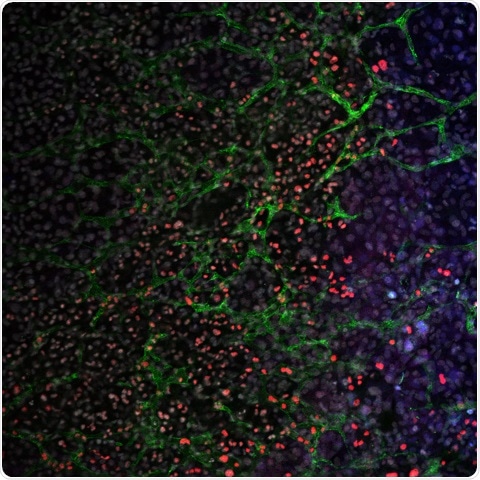For years, stem cells have continued to have excellent potential in regenerative medicine. In the past 10 years, many studies have demonstrated that this cell type, known as “mother cell” in Spanish because of its potential to promote a wide range of cell types, can be applied in the field of regenerative medicine for diseases, like nervous and muscular system disorders, among others.

Mouse embryoid body with multiple cell types (in different colors) generated in vitro after expression of miR-203 in stem cells. Image Credit: Spanish National Cancer Research Center (CNIO).
For this concept, scientists and stem cell innovators Sir John B. Gurdon and Shinya Yamanaka were awarded the Nobel Prize in Physiology and Medicine in 2012.
But these cell therapies have certain limitations: the stem cells that can be cultured in the laboratory have low quality, which hinders their application for therapeutic purposes.
Researchers from the Cell Division and Cancer Group of the Spanish National Cancer Research Center (CNIO), headed by scientist Marcos Malumbres, have now developed a novel, simple, and rapid technology that improves the ability of stem cells to differentiate into adult cells both in vitro and in vivo. The study results will soon be reported in The EMBO Journal.
In recent years, several protocols have been proposed to obtain reprogrammed stem cells in the laboratory from adult cells, but very few to improve the cells we already have. The method we developed is able to significantly increase the quality of stem cells obtained by any other protocol, thus favouring the efficiency of the production of specialised cell types.”
María Salazar-Roa, Study First Author and Researcher, Spanish National Cancer Research Center
Salazar-Roa is also the co-corresponding author of the study.
In the latest research, the scientists detected an RNA sequence, known as microRNA 203, which exists in the earliest stage of embryonic development—prior to the implantation of the embryo in the womb and when stem cells still have their highest ability to produce all types of tissues.
Upon adding this molecule to stem cells in the laboratory, the cells were found to be able to change into other types of cells more significantly.
To confirm this, the researchers employed stem cells of genetically modified mice, and of human and murine origin.
The results were spectacular, both in mouse cells and in human cells. Application of this microRNA for just 5 days boosts the potential of stem cells in all scenarios we tested and improves their ability to become other specialised cells, even months after having been in contact with the microRNA.”
María Salazar-Roa, Study First Author and Researcher, Spanish National Cancer Research Center
The study showed that cells altered by this novel procedure are more efficient at producing functional cardiac cells, paving the way for an enhanced generation of different types of cells essential for treating degenerative disorders.
To bring this asset to the clinic, collaboration with laboratories or companies that want to exploit this technology is now necessary in each specific case.”
Marcos Malumbres, Researcher, Spanish National Cancer Research Center
Malumbres also heads the CNIO Cell and Cancer Division Group.
In this regard, Salazar-Roa recently took part, in close association with the CNIO’s Innovation group, in prominent innovation programs, like CaixaImpulse of the “la Caixa” Foundation and IDEA2 Global of the Massachusetts Institute of Technology (MIT), from which they also received funding to initiate the development of this new technology.
Source:
Journal reference:
Salazar-Roa, M., et al. (2020) Transient exposure to miR-203 enhances the differentiation capacity of established pluripotent stem cells. EMBO Journal. doi.org/10.15252/embj.2019104324.